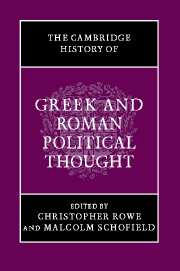Book contents
- Frontmatter
- Introduction
- PART I ARCHAIC AND CLASSICAL GREECE
- 1 Greek political thought: the historical context
- THE BEGINNINGS
- 2 Poets, lawgivers, and the beginnings of political reflection in archaic Greece
- 3 Greek drama and political theory
- 4 Herodotus, Thucydides and the sophists
- 5 Democritus
- 6 The Orators
- 7 Xenophon and Isocrates
- 8 Socrates and Plato: an introduction
- 9 Socrates
- 10 Approaching the Republic
- 11 The Politicus and other dialogues
- 12 The Laws
- 13 Plato and practical politics
- 14 Cleitophon and Minos
- ARISTOTLE
- PART II THE HELLENISTIC AND ROMAN WORLDS
- Epilogue
- Bibliographies
- Index
- Map 1. Greece in the fifth century bc"
- References
5 - Democritus
from THE BEGINNINGS
Published online by Cambridge University Press: 28 March 2008
- Frontmatter
- Introduction
- PART I ARCHAIC AND CLASSICAL GREECE
- 1 Greek political thought: the historical context
- THE BEGINNINGS
- 2 Poets, lawgivers, and the beginnings of political reflection in archaic Greece
- 3 Greek drama and political theory
- 4 Herodotus, Thucydides and the sophists
- 5 Democritus
- 6 The Orators
- 7 Xenophon and Isocrates
- 8 Socrates and Plato: an introduction
- 9 Socrates
- 10 Approaching the Republic
- 11 The Politicus and other dialogues
- 12 The Laws
- 13 Plato and practical politics
- 14 Cleitophon and Minos
- ARISTOTLE
- PART II THE HELLENISTIC AND ROMAN WORLDS
- Epilogue
- Bibliographies
- Index
- Map 1. Greece in the fifth century bc"
- References
Summary
Discussion of the ethical and political views of Democritus of Abdera (born c. 460 bc) cannot avoid preliminary consideration of our evidence for that area of his thought. In all other areas except ethics and epistemology we are virtually wholly dependent on doxographical evidence. When we come to ethics, by contrast, the doxography is meagre (see DK 68 a 166–70), but on the other hand we possess over two hundred purported quotations from Democritus on ethical topics. Yet far from giving us greater confidence in our judgments in this area, the problematic character of these quotations has the opposite effect. This is because the great majority of those quotations are contained in two collections, those of Stobaeus and the so-called ‘Sayings of Democrates’ (sic), where they are presented in isolation from any context and without attribution to any specific work. It is therefore necessary to undertake a brief consideration of the authenticity of this material before proceeding to discuss the content of Democritus’ ethical and political views.
Scepticism about the authenticity of the ethical fragments is grounded in two primary considerations, first the silence of Aristotle and Theophrastus on Democritus’ ethical writings and secondly the fact that our sources for the bulk of the fragments, the collections of Stobaeus and ‘Democrates’, cannot plausibly be thought to have been compiled from direct access to texts of Democritus. Stobaeus’ anthology is clearly based on earlier collections which included, besides excerpts from extant texts of authors such as Plato and the tragedians, anecdotes and maxims attributed to such famous figures as Pythagoras and Socrates, which cannot have had their origin in works written by their supposed authors.
- Type
- Chapter
- Information
- The Cambridge History of Greek and Roman Political Thought , pp. 122 - 129Publisher: Cambridge University PressPrint publication year: 2000
References
- 2
- Cited by

